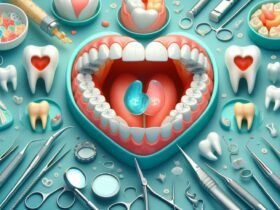Table of Contents
Power chains are a common addition to braces that help speed up the process of aligning teeth. They are essentially a series of connected elastic rings that apply continuous pressure to the teeth. While they offer several benefits, such as faster treatment and effective gap closure, they also come with risks, including potential gum disease and discomfort. This article will explore the benefits and risks of using power chains with braces, helping you make an informed decision about your orthodontic treatment.
Key Takeaways
Understanding Power Chains for Braces


What Are Power Chains?
Power chains are a series of elastic rings linked together, often used in orthodontics to apply extra force to teeth. These chains are typically used with braces to help close gaps and align teeth more effectively. Unlike individual elastic ligatures that hold the wire to each bracket, power chains connect multiple brackets, forming a continuous band across the teeth.
How Do Power Chains Work?
Power chains work by applying consistent pressure to the teeth, which helps move them into the desired position more quickly. They are often used towards the end of orthodontic treatment to close any remaining gaps. The extra force exerted by power chains can speed up the treatment process, making them a popular choice among orthodontists.
Types of Power Chains
There are three main types of power chains:
Each type serves a different purpose and is chosen based on the specific needs of the patient’s orthodontic treatment.
Benefits of Using Power Chains with Braces


Faster Treatment Times
One of the main benefits of using power chains with braces is that they can speed up the treatment process. Power chains apply more pressure than traditional brackets and wires, which helps move teeth into their correct positions more quickly. This means you might spend less time wearing braces overall.
Effective Gap Closure
Power chains are particularly effective at closing gaps between teeth. Whether the gaps are due to extractions or natural spacing, power chains can help bring teeth closer together. This is because they provide continuous force, which is more efficient than using individual elastics.
Improved Teeth Alignment
Another advantage of power chains is their ability to improve teeth alignment. They can correct issues like crooked teeth, misalignments, and malocclusions. By applying consistent pressure, power chains help ensure that your teeth move into the desired positions, resulting in a better overall alignment.
Risks and Side Effects of Power Chain Braces
Power chain braces, like any orthodontic treatment, come with their own set of risks and side effects. It’s important to be aware of these potential issues to manage them effectively.
Choosing the Right Power Chain Color


Popular Color Choices
Power chains for braces come in a variety of colors, allowing you to personalize your orthodontic treatment. Some popular choices include:
Factors to Consider
When choosing a color for your power chains, consider the following factors:
- 1. Stain Resistance: Colors like silver or smoke are best for resisting stains.
- 2. Personal Preference: Choose a color that matches your personality and style.
- 3. Lifestyle: Think about your daily activities and how the color might fit in.
Tips for Avoiding Stains
To keep your power chains looking fresh, follow these tips:
Remember: You can change your power chain color at each orthodontic appointment, so feel free to experiment with different shades.
Roseberry oil can also be used to maintain oral hygiene and keep your braces clean.
Maintaining Oral Hygiene with Power Chain Braces
Maintaining good oral hygiene is crucial when you have power chain braces. Proper care can prevent complications and ensure your treatment progresses smoothly. Here are some tips to help you keep your teeth and braces clean and healthy.
Brushing and Flossing Tips
Using Interdental Brushes
Interdental brushes are small brushes designed to clean between your teeth and around your braces. They can help remove food particles and plaque that regular brushing might miss. Use them gently to avoid damaging your braces or power chains.
Regular Dental Check-Ups
Regular visits to your dentist or orthodontist are essential. They can check for any issues with your braces and ensure your teeth and gums are healthy. If you notice any problems, such as a broken power chain or exposed tooth root, contact your orthodontist immediately.
Taking care of your braces and maintaining good oral hygiene can make a significant difference in your treatment outcome. Avoiding certain foods and practicing good dental habits will help you achieve the best results.
By following these tips, you can keep your teeth and braces clean, reduce the risk of gum disease and tooth decay, and ensure your orthodontic treatment stays on track.
Who Can Benefit from Power Chain Braces?


Children and Teens
Power chain braces are often used for children and teens, especially those between the ages of 8 and 14. During this period, the facial bones are still growing, making it easier to move teeth into the desired position. This age group benefits the most from power chains because their bones are more flexible.
Adults
Adults can also benefit from power chain braces. In fact, about 1 out of 5 people undergoing orthodontic treatment are over 21 years old. Power chains can help adults achieve better teeth alignment and close gaps that may have developed over time.
Specific Orthodontic Cases
Power chains are particularly effective for certain orthodontic issues. They are commonly used for:
Power chains are versatile and can be used to treat a variety of dental problems, making them a valuable tool in orthodontics.
What to Expect During Treatment with Power Chains
Initial Placement
When you first get power chains, your orthodontist will attach them to your braces. This process is similar to getting your braces adjusted. The power chains are connected to the brackets on your teeth, replacing the individual elastic ligatures. You might feel some pressure as the power chains start working to move your teeth.
Adjustment Appointments
Regular visits to your orthodontist are essential. During these appointments, the archwire is tightened or replaced, and o-rings or power chains are changed to maintain the necessary pressure on your teeth. These adjustments ensure that your treatment stays on track and progresses as planned.
Post-Treatment Care
After your treatment with power chains is complete, your orthodontist will remove them along with your braces. You will likely need to wear a retainer to keep your teeth in their new positions. It’s important to follow your orthodontist’s instructions to prevent your teeth from shifting back.
Power chains can significantly speed up your orthodontic treatment, but they require regular adjustments and proper care to be effective.
Conclusion
In summary, power chains for braces offer a mix of benefits and risks. They can speed up the process of aligning teeth, close gaps, and correct bites more efficiently than traditional braces alone. However, they also come with potential downsides like discomfort, gum disease, and the need for regular adjustments. It’s important to maintain good oral hygiene and follow your orthodontist’s advice to minimize these risks. Ultimately, whether power chains are right for you depends on your specific dental needs and lifestyle. Always consult with your orthodontist to make the best decision for your smile.
Frequently Asked Questions
What are power chains for braces?
Power chains are a series of connected elastic rings used in braces to apply extra force to your teeth. They help move your teeth more efficiently than regular braces alone.
How do power chains work?
Power chains work by exerting continuous pressure on your teeth. This helps to close gaps, align crooked teeth, and improve overall tooth spacing.
What are the benefits of using power chains?
Power chains can speed up treatment time, effectively close gaps between teeth, and improve overall teeth alignment.
Are there any risks or side effects of power chain braces?
Yes, there are some risks. These include gum disease, tooth decay, root resorption (shortening of tooth roots), pain, and the need for frequent adjustments.
How do I choose the right power chain color?
You can choose from many colors. Consider factors like your lifestyle and diet, as some foods can stain the power chains. Silver or smoke-colored chains are less likely to show stains.
How should I maintain oral hygiene with power chain braces?
Brush and floss regularly, use interdental brushes, and go for regular dental check-ups to keep your teeth and gums healthy while wearing power chain braces.














Leave a Review